Impact of Economic and Non-Economic Factors on Vodafone's Behavior
VerifiedAdded on 2023/01/12
|12
|3827
|45
AI Summary
This report analyzes the impact of economic and non-economic factors on the behavior of Vodafone, a telecommunications company in the UK. It includes a SWOT analysis and PESTLE analysis to evaluate the internal and external environment. The report also discusses the implications of Brexit on Vodafone's operations.
Contribute Materials
Your contribution can guide someone’s learning journey. Share your
documents today.
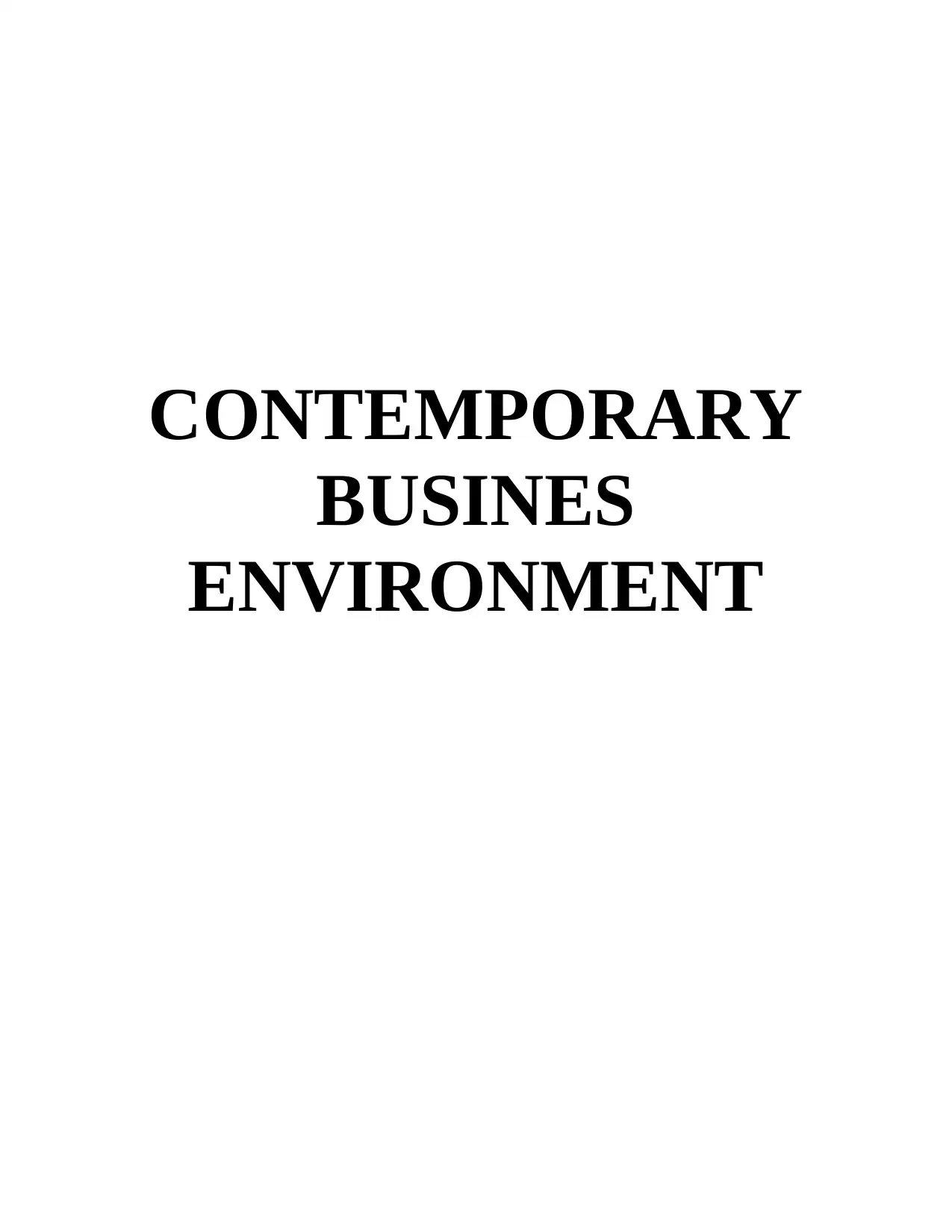
CONTEMPORARY
BUSINES
ENVIRONMENT
BUSINES
ENVIRONMENT
Secure Best Marks with AI Grader
Need help grading? Try our AI Grader for instant feedback on your assignments.
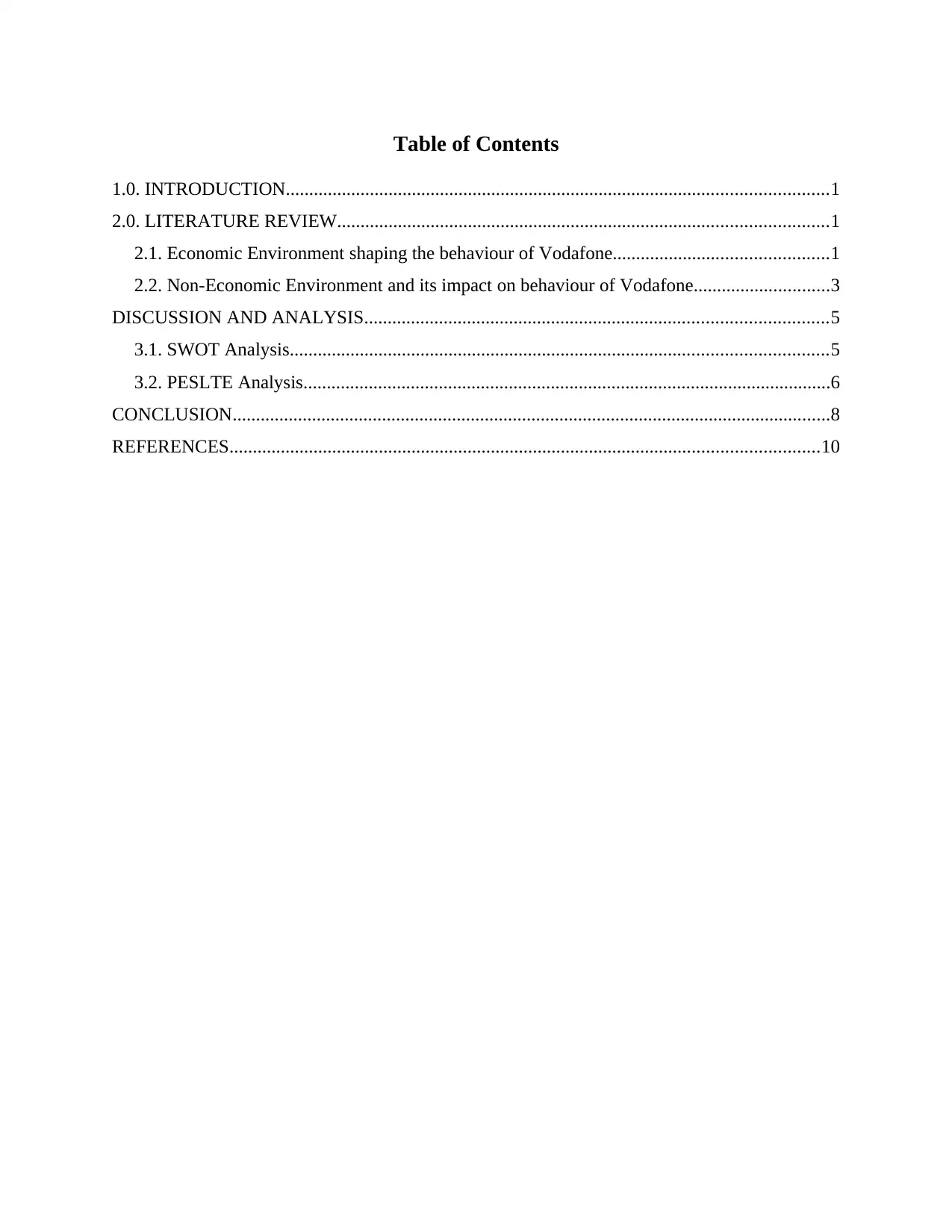
Table of Contents
1.0. INTRODUCTION....................................................................................................................1
2.0. LITERATURE REVIEW.........................................................................................................1
2.1. Economic Environment shaping the behaviour of Vodafone..............................................1
2.2. Non-Economic Environment and its impact on behaviour of Vodafone.............................3
DISCUSSION AND ANALYSIS...................................................................................................5
3.1. SWOT Analysis...................................................................................................................5
3.2. PESLTE Analysis.................................................................................................................6
CONCLUSION................................................................................................................................8
REFERENCES..............................................................................................................................10
1.0. INTRODUCTION....................................................................................................................1
2.0. LITERATURE REVIEW.........................................................................................................1
2.1. Economic Environment shaping the behaviour of Vodafone..............................................1
2.2. Non-Economic Environment and its impact on behaviour of Vodafone.............................3
DISCUSSION AND ANALYSIS...................................................................................................5
3.1. SWOT Analysis...................................................................................................................5
3.2. PESLTE Analysis.................................................................................................................6
CONCLUSION................................................................................................................................8
REFERENCES..............................................................................................................................10
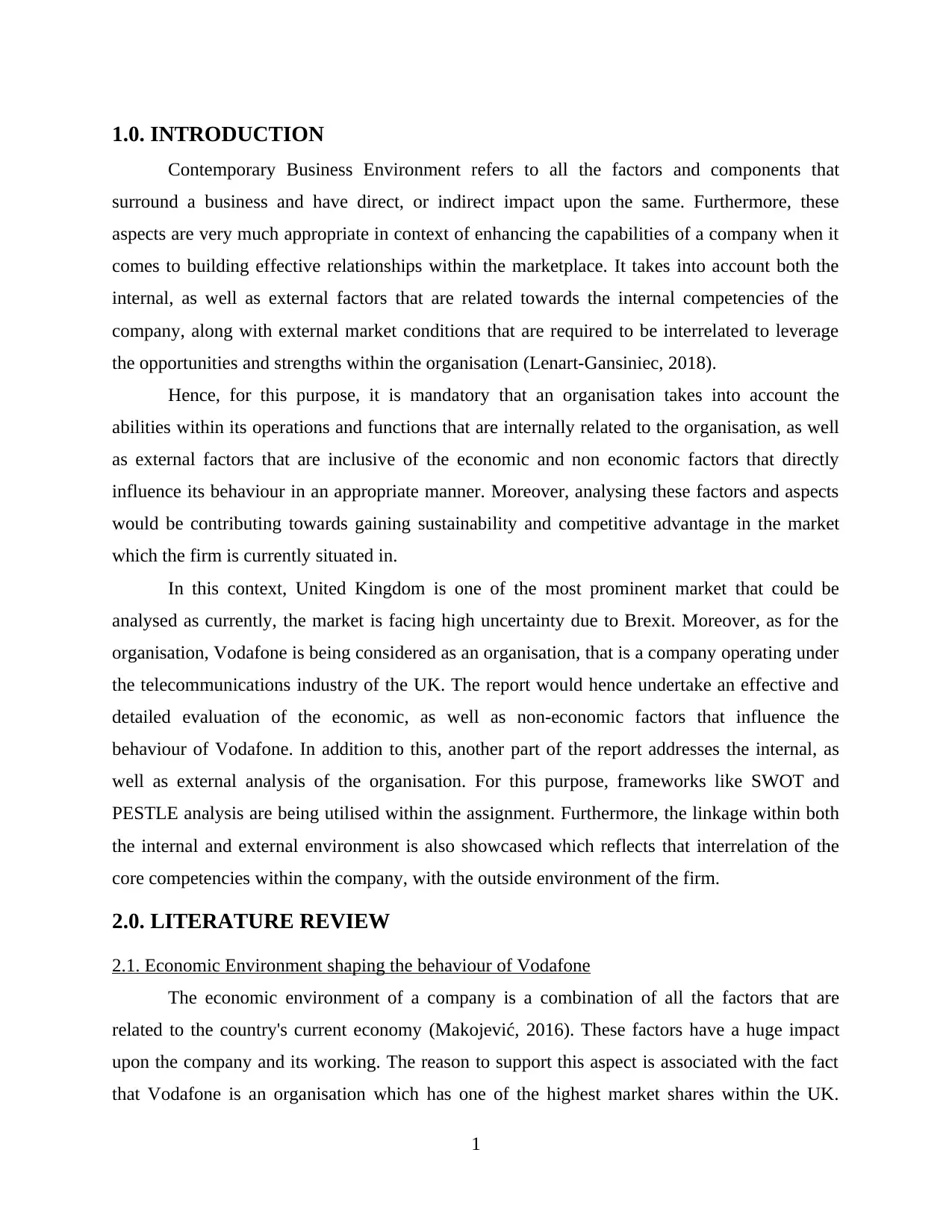
1.0. INTRODUCTION
Contemporary Business Environment refers to all the factors and components that
surround a business and have direct, or indirect impact upon the same. Furthermore, these
aspects are very much appropriate in context of enhancing the capabilities of a company when it
comes to building effective relationships within the marketplace. It takes into account both the
internal, as well as external factors that are related towards the internal competencies of the
company, along with external market conditions that are required to be interrelated to leverage
the opportunities and strengths within the organisation (Lenart-Gansiniec, 2018).
Hence, for this purpose, it is mandatory that an organisation takes into account the
abilities within its operations and functions that are internally related to the organisation, as well
as external factors that are inclusive of the economic and non economic factors that directly
influence its behaviour in an appropriate manner. Moreover, analysing these factors and aspects
would be contributing towards gaining sustainability and competitive advantage in the market
which the firm is currently situated in.
In this context, United Kingdom is one of the most prominent market that could be
analysed as currently, the market is facing high uncertainty due to Brexit. Moreover, as for the
organisation, Vodafone is being considered as an organisation, that is a company operating under
the telecommunications industry of the UK. The report would hence undertake an effective and
detailed evaluation of the economic, as well as non-economic factors that influence the
behaviour of Vodafone. In addition to this, another part of the report addresses the internal, as
well as external analysis of the organisation. For this purpose, frameworks like SWOT and
PESTLE analysis are being utilised within the assignment. Furthermore, the linkage within both
the internal and external environment is also showcased which reflects that interrelation of the
core competencies within the company, with the outside environment of the firm.
2.0. LITERATURE REVIEW
2.1. Economic Environment shaping the behaviour of Vodafone
The economic environment of a company is a combination of all the factors that are
related to the country's current economy (Makojević, 2016). These factors have a huge impact
upon the company and its working. The reason to support this aspect is associated with the fact
that Vodafone is an organisation which has one of the highest market shares within the UK.
1
Contemporary Business Environment refers to all the factors and components that
surround a business and have direct, or indirect impact upon the same. Furthermore, these
aspects are very much appropriate in context of enhancing the capabilities of a company when it
comes to building effective relationships within the marketplace. It takes into account both the
internal, as well as external factors that are related towards the internal competencies of the
company, along with external market conditions that are required to be interrelated to leverage
the opportunities and strengths within the organisation (Lenart-Gansiniec, 2018).
Hence, for this purpose, it is mandatory that an organisation takes into account the
abilities within its operations and functions that are internally related to the organisation, as well
as external factors that are inclusive of the economic and non economic factors that directly
influence its behaviour in an appropriate manner. Moreover, analysing these factors and aspects
would be contributing towards gaining sustainability and competitive advantage in the market
which the firm is currently situated in.
In this context, United Kingdom is one of the most prominent market that could be
analysed as currently, the market is facing high uncertainty due to Brexit. Moreover, as for the
organisation, Vodafone is being considered as an organisation, that is a company operating under
the telecommunications industry of the UK. The report would hence undertake an effective and
detailed evaluation of the economic, as well as non-economic factors that influence the
behaviour of Vodafone. In addition to this, another part of the report addresses the internal, as
well as external analysis of the organisation. For this purpose, frameworks like SWOT and
PESTLE analysis are being utilised within the assignment. Furthermore, the linkage within both
the internal and external environment is also showcased which reflects that interrelation of the
core competencies within the company, with the outside environment of the firm.
2.0. LITERATURE REVIEW
2.1. Economic Environment shaping the behaviour of Vodafone
The economic environment of a company is a combination of all the factors that are
related to the country's current economy (Makojević, 2016). These factors have a huge impact
upon the company and its working. The reason to support this aspect is associated with the fact
that Vodafone is an organisation which has one of the highest market shares within the UK.
1
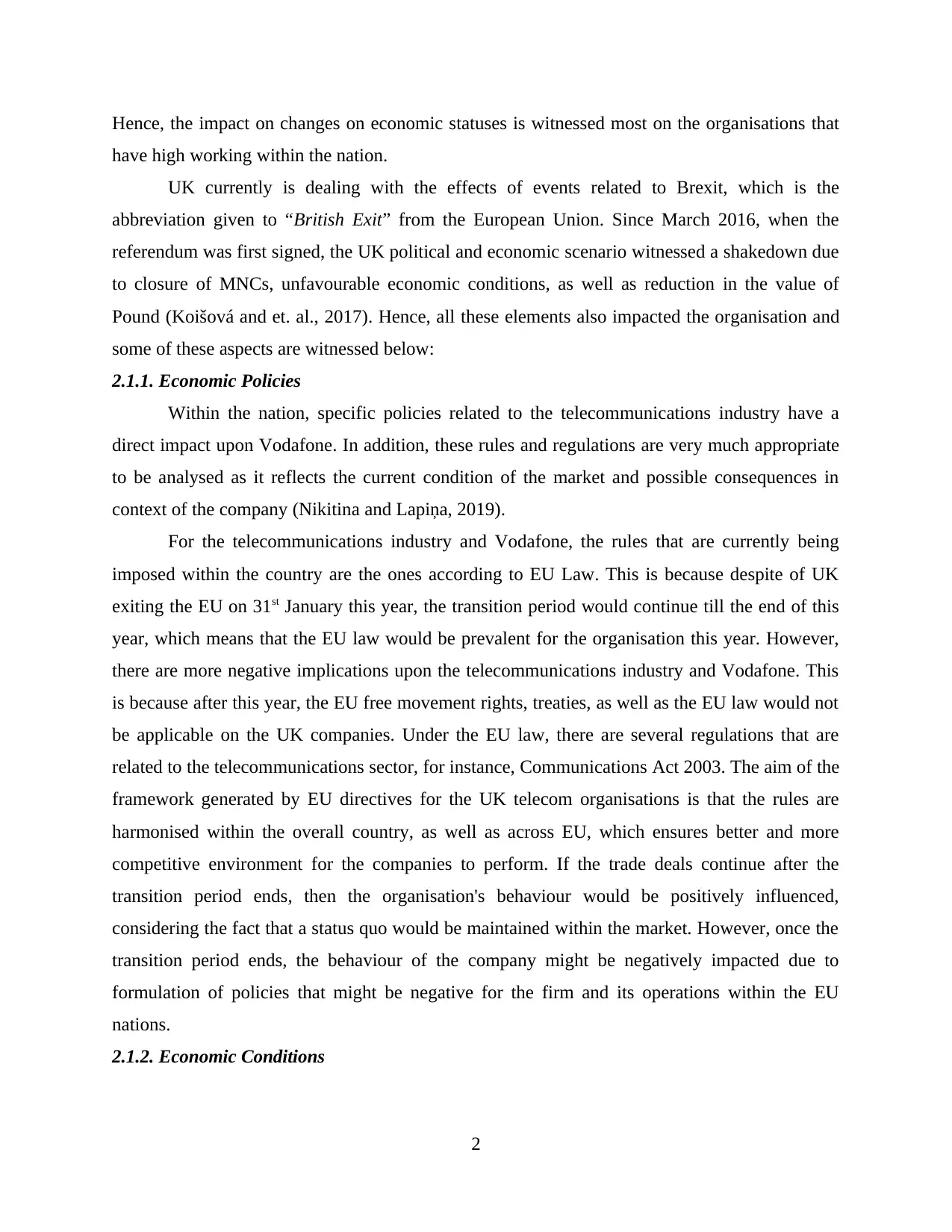
Hence, the impact on changes on economic statuses is witnessed most on the organisations that
have high working within the nation.
UK currently is dealing with the effects of events related to Brexit, which is the
abbreviation given to “British Exit” from the European Union. Since March 2016, when the
referendum was first signed, the UK political and economic scenario witnessed a shakedown due
to closure of MNCs, unfavourable economic conditions, as well as reduction in the value of
Pound (Koišová and et. al., 2017). Hence, all these elements also impacted the organisation and
some of these aspects are witnessed below:
2.1.1. Economic Policies
Within the nation, specific policies related to the telecommunications industry have a
direct impact upon Vodafone. In addition, these rules and regulations are very much appropriate
to be analysed as it reflects the current condition of the market and possible consequences in
context of the company (Nikitina and Lapiņa, 2019).
For the telecommunications industry and Vodafone, the rules that are currently being
imposed within the country are the ones according to EU Law. This is because despite of UK
exiting the EU on 31st January this year, the transition period would continue till the end of this
year, which means that the EU law would be prevalent for the organisation this year. However,
there are more negative implications upon the telecommunications industry and Vodafone. This
is because after this year, the EU free movement rights, treaties, as well as the EU law would not
be applicable on the UK companies. Under the EU law, there are several regulations that are
related to the telecommunications sector, for instance, Communications Act 2003. The aim of the
framework generated by EU directives for the UK telecom organisations is that the rules are
harmonised within the overall country, as well as across EU, which ensures better and more
competitive environment for the companies to perform. If the trade deals continue after the
transition period ends, then the organisation's behaviour would be positively influenced,
considering the fact that a status quo would be maintained within the market. However, once the
transition period ends, the behaviour of the company might be negatively impacted due to
formulation of policies that might be negative for the firm and its operations within the EU
nations.
2.1.2. Economic Conditions
2
have high working within the nation.
UK currently is dealing with the effects of events related to Brexit, which is the
abbreviation given to “British Exit” from the European Union. Since March 2016, when the
referendum was first signed, the UK political and economic scenario witnessed a shakedown due
to closure of MNCs, unfavourable economic conditions, as well as reduction in the value of
Pound (Koišová and et. al., 2017). Hence, all these elements also impacted the organisation and
some of these aspects are witnessed below:
2.1.1. Economic Policies
Within the nation, specific policies related to the telecommunications industry have a
direct impact upon Vodafone. In addition, these rules and regulations are very much appropriate
to be analysed as it reflects the current condition of the market and possible consequences in
context of the company (Nikitina and Lapiņa, 2019).
For the telecommunications industry and Vodafone, the rules that are currently being
imposed within the country are the ones according to EU Law. This is because despite of UK
exiting the EU on 31st January this year, the transition period would continue till the end of this
year, which means that the EU law would be prevalent for the organisation this year. However,
there are more negative implications upon the telecommunications industry and Vodafone. This
is because after this year, the EU free movement rights, treaties, as well as the EU law would not
be applicable on the UK companies. Under the EU law, there are several regulations that are
related to the telecommunications sector, for instance, Communications Act 2003. The aim of the
framework generated by EU directives for the UK telecom organisations is that the rules are
harmonised within the overall country, as well as across EU, which ensures better and more
competitive environment for the companies to perform. If the trade deals continue after the
transition period ends, then the organisation's behaviour would be positively influenced,
considering the fact that a status quo would be maintained within the market. However, once the
transition period ends, the behaviour of the company might be negatively impacted due to
formulation of policies that might be negative for the firm and its operations within the EU
nations.
2.1.2. Economic Conditions
2
Secure Best Marks with AI Grader
Need help grading? Try our AI Grader for instant feedback on your assignments.
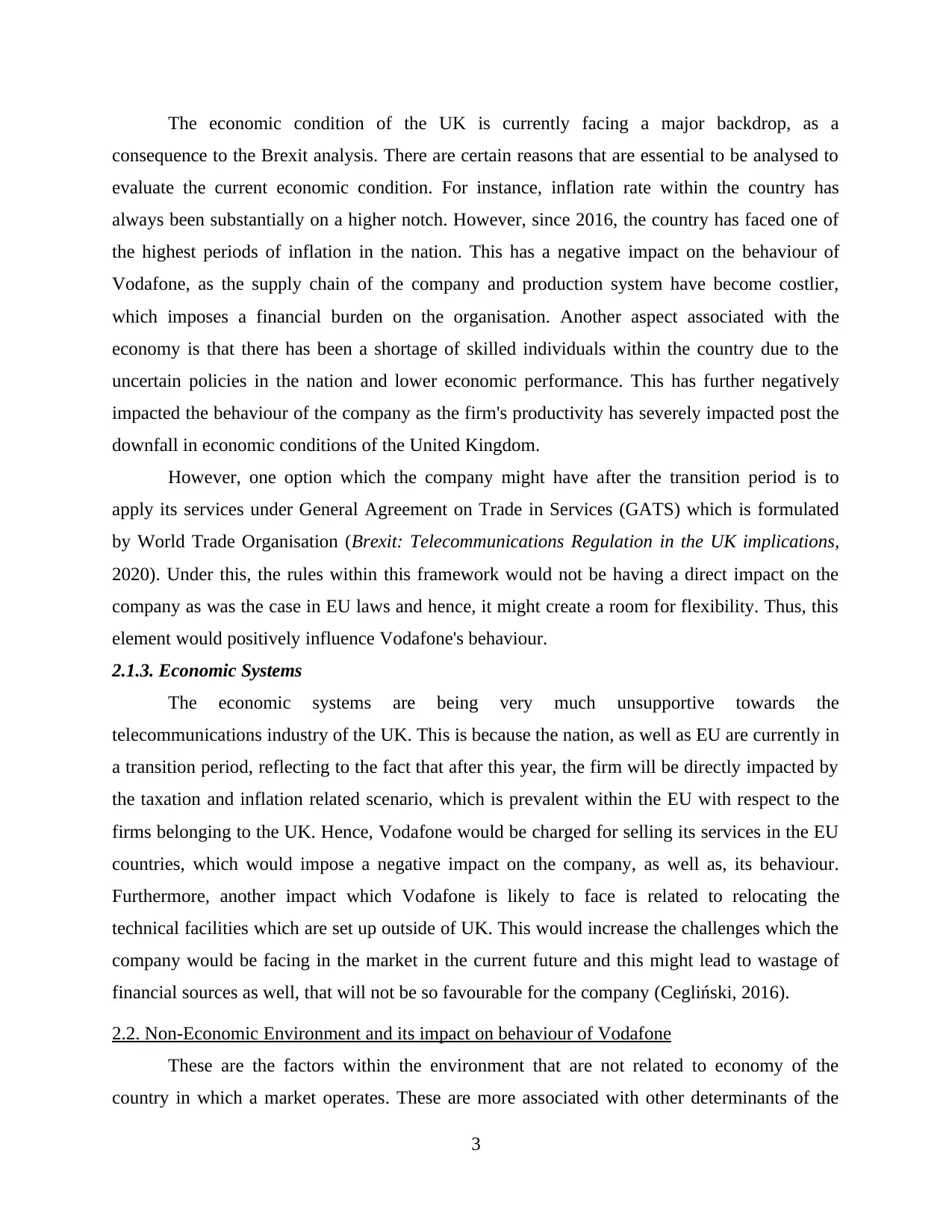
The economic condition of the UK is currently facing a major backdrop, as a
consequence to the Brexit analysis. There are certain reasons that are essential to be analysed to
evaluate the current economic condition. For instance, inflation rate within the country has
always been substantially on a higher notch. However, since 2016, the country has faced one of
the highest periods of inflation in the nation. This has a negative impact on the behaviour of
Vodafone, as the supply chain of the company and production system have become costlier,
which imposes a financial burden on the organisation. Another aspect associated with the
economy is that there has been a shortage of skilled individuals within the country due to the
uncertain policies in the nation and lower economic performance. This has further negatively
impacted the behaviour of the company as the firm's productivity has severely impacted post the
downfall in economic conditions of the United Kingdom.
However, one option which the company might have after the transition period is to
apply its services under General Agreement on Trade in Services (GATS) which is formulated
by World Trade Organisation (Brexit: Telecommunications Regulation in the UK implications,
2020). Under this, the rules within this framework would not be having a direct impact on the
company as was the case in EU laws and hence, it might create a room for flexibility. Thus, this
element would positively influence Vodafone's behaviour.
2.1.3. Economic Systems
The economic systems are being very much unsupportive towards the
telecommunications industry of the UK. This is because the nation, as well as EU are currently in
a transition period, reflecting to the fact that after this year, the firm will be directly impacted by
the taxation and inflation related scenario, which is prevalent within the EU with respect to the
firms belonging to the UK. Hence, Vodafone would be charged for selling its services in the EU
countries, which would impose a negative impact on the company, as well as, its behaviour.
Furthermore, another impact which Vodafone is likely to face is related to relocating the
technical facilities which are set up outside of UK. This would increase the challenges which the
company would be facing in the market in the current future and this might lead to wastage of
financial sources as well, that will not be so favourable for the company (Cegliński, 2016).
2.2. Non-Economic Environment and its impact on behaviour of Vodafone
These are the factors within the environment that are not related to economy of the
country in which a market operates. These are more associated with other determinants of the
3
consequence to the Brexit analysis. There are certain reasons that are essential to be analysed to
evaluate the current economic condition. For instance, inflation rate within the country has
always been substantially on a higher notch. However, since 2016, the country has faced one of
the highest periods of inflation in the nation. This has a negative impact on the behaviour of
Vodafone, as the supply chain of the company and production system have become costlier,
which imposes a financial burden on the organisation. Another aspect associated with the
economy is that there has been a shortage of skilled individuals within the country due to the
uncertain policies in the nation and lower economic performance. This has further negatively
impacted the behaviour of the company as the firm's productivity has severely impacted post the
downfall in economic conditions of the United Kingdom.
However, one option which the company might have after the transition period is to
apply its services under General Agreement on Trade in Services (GATS) which is formulated
by World Trade Organisation (Brexit: Telecommunications Regulation in the UK implications,
2020). Under this, the rules within this framework would not be having a direct impact on the
company as was the case in EU laws and hence, it might create a room for flexibility. Thus, this
element would positively influence Vodafone's behaviour.
2.1.3. Economic Systems
The economic systems are being very much unsupportive towards the
telecommunications industry of the UK. This is because the nation, as well as EU are currently in
a transition period, reflecting to the fact that after this year, the firm will be directly impacted by
the taxation and inflation related scenario, which is prevalent within the EU with respect to the
firms belonging to the UK. Hence, Vodafone would be charged for selling its services in the EU
countries, which would impose a negative impact on the company, as well as, its behaviour.
Furthermore, another impact which Vodafone is likely to face is related to relocating the
technical facilities which are set up outside of UK. This would increase the challenges which the
company would be facing in the market in the current future and this might lead to wastage of
financial sources as well, that will not be so favourable for the company (Cegliński, 2016).
2.2. Non-Economic Environment and its impact on behaviour of Vodafone
These are the factors within the environment that are not related to economy of the
country in which a market operates. These are more associated with other determinants of the
3

business environment such as the customers, as well as the environmental factors. Hence, their
impact upon the Vodafone is elaborated below:
2.2.1. Natural Factors
These factors are related to the weather and climate conditions, along with ecological and
geographical aspects within the country that would be having direct, as well as indirect impacts
upon Vodafone. As for the UK telecommunications industry, there are several environmental
goals within the country that are also referred to as Sustainable Development Goals, which are
directed towards protection of environment. These government driven goals have several climate
actions that address the change that is currently taking place in the environment. In relation to the
company, this enhances the positive influence within the behaviour of Vodafone,, as it presents
opportunities for the company to work towards reducing the CO2 emissions from its operations
in an appropriate and sustainable manner. Moreover, another positive factor contributing towards
the behaviour of Vodafone is that the the overall industry is currently focusing upon the
hydrogen fuel cells that would help the companies to backup the energy that is being utilised by
them. This would present the company with effective opportunity related to ensuring that its
actions protect the environment in a prominent manner.
2.2.2. Demographic Factors
Within these factors, the elements that have been taken into consideration is associated
with gender, lifestyle, social factors, and so forth. As for the current market in the UK, the
individuals are very much affiliated with latest technologies. Moreover, due to better and
effective digitalised devices, there is a huge scope of the telecommunications market to develop
high end technologies that support better and advanced network outputs for individuals.
Furthermore, the current social factor that is being essential in context of the industry and for
Vodafone is the lifestyle of individuals within the UK (Lingeberzins, 2017). Currently, the whole
target market of this industry is driven towards streaming web contents and heavy reliance on
downloading videos, apps, games and so forth. Hence, in this relation, the company has ample
opportunities to ensure creation and usage of 5G networks and work on consistency of its
provision to the customers. Hence, a very positive influence of this factor is imposed on
Vodafone and the overall telecommunications industry of the United Kingdom.
2.2.3. Cultural Factors
4
impact upon the Vodafone is elaborated below:
2.2.1. Natural Factors
These factors are related to the weather and climate conditions, along with ecological and
geographical aspects within the country that would be having direct, as well as indirect impacts
upon Vodafone. As for the UK telecommunications industry, there are several environmental
goals within the country that are also referred to as Sustainable Development Goals, which are
directed towards protection of environment. These government driven goals have several climate
actions that address the change that is currently taking place in the environment. In relation to the
company, this enhances the positive influence within the behaviour of Vodafone,, as it presents
opportunities for the company to work towards reducing the CO2 emissions from its operations
in an appropriate and sustainable manner. Moreover, another positive factor contributing towards
the behaviour of Vodafone is that the the overall industry is currently focusing upon the
hydrogen fuel cells that would help the companies to backup the energy that is being utilised by
them. This would present the company with effective opportunity related to ensuring that its
actions protect the environment in a prominent manner.
2.2.2. Demographic Factors
Within these factors, the elements that have been taken into consideration is associated
with gender, lifestyle, social factors, and so forth. As for the current market in the UK, the
individuals are very much affiliated with latest technologies. Moreover, due to better and
effective digitalised devices, there is a huge scope of the telecommunications market to develop
high end technologies that support better and advanced network outputs for individuals.
Furthermore, the current social factor that is being essential in context of the industry and for
Vodafone is the lifestyle of individuals within the UK (Lingeberzins, 2017). Currently, the whole
target market of this industry is driven towards streaming web contents and heavy reliance on
downloading videos, apps, games and so forth. Hence, in this relation, the company has ample
opportunities to ensure creation and usage of 5G networks and work on consistency of its
provision to the customers. Hence, a very positive influence of this factor is imposed on
Vodafone and the overall telecommunications industry of the United Kingdom.
2.2.3. Cultural Factors
4
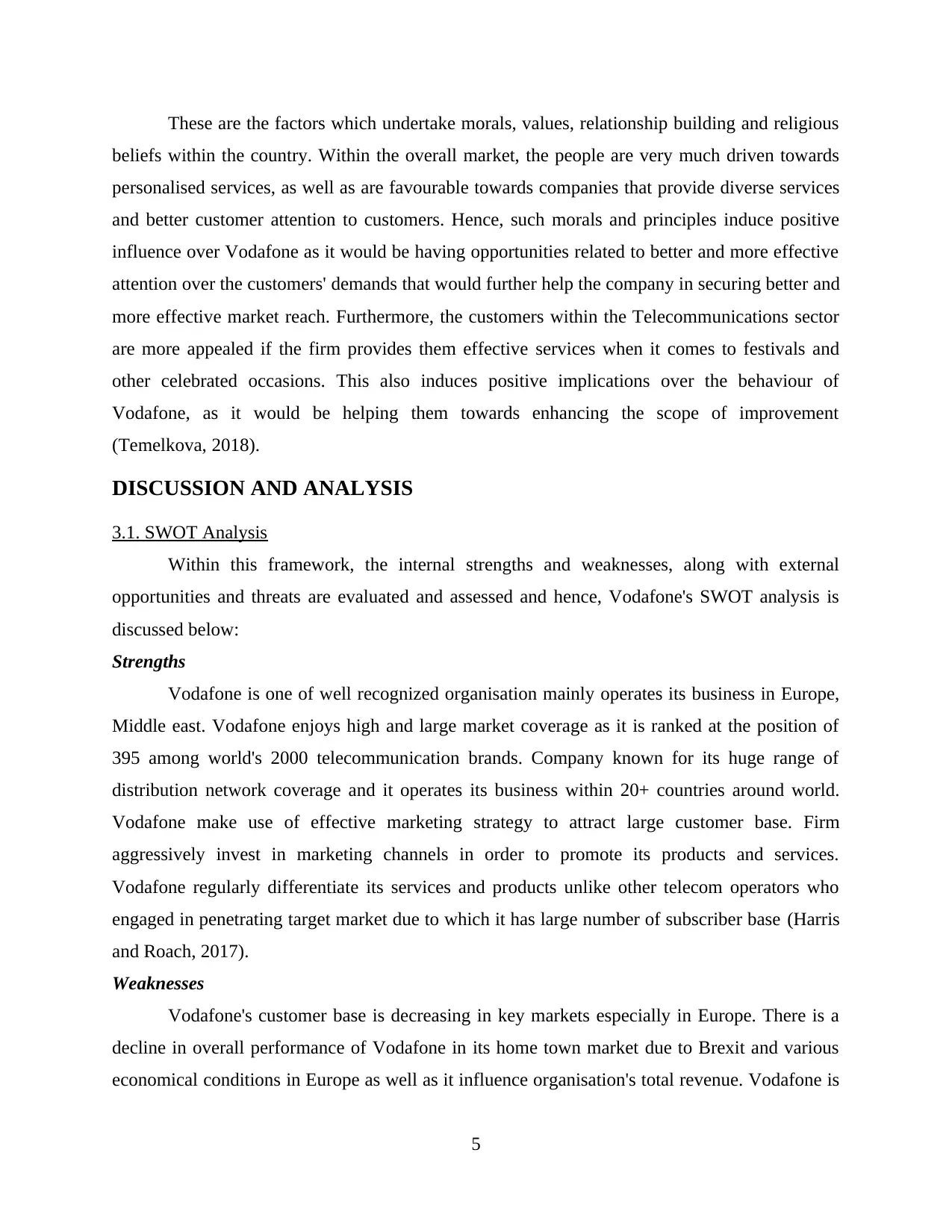
These are the factors which undertake morals, values, relationship building and religious
beliefs within the country. Within the overall market, the people are very much driven towards
personalised services, as well as are favourable towards companies that provide diverse services
and better customer attention to customers. Hence, such morals and principles induce positive
influence over Vodafone as it would be having opportunities related to better and more effective
attention over the customers' demands that would further help the company in securing better and
more effective market reach. Furthermore, the customers within the Telecommunications sector
are more appealed if the firm provides them effective services when it comes to festivals and
other celebrated occasions. This also induces positive implications over the behaviour of
Vodafone, as it would be helping them towards enhancing the scope of improvement
(Temelkova, 2018).
DISCUSSION AND ANALYSIS
3.1. SWOT Analysis
Within this framework, the internal strengths and weaknesses, along with external
opportunities and threats are evaluated and assessed and hence, Vodafone's SWOT analysis is
discussed below:
Strengths
Vodafone is one of well recognized organisation mainly operates its business in Europe,
Middle east. Vodafone enjoys high and large market coverage as it is ranked at the position of
395 among world's 2000 telecommunication brands. Company known for its huge range of
distribution network coverage and it operates its business within 20+ countries around world.
Vodafone make use of effective marketing strategy to attract large customer base. Firm
aggressively invest in marketing channels in order to promote its products and services.
Vodafone regularly differentiate its services and products unlike other telecom operators who
engaged in penetrating target market due to which it has large number of subscriber base (Harris
and Roach, 2017).
Weaknesses
Vodafone's customer base is decreasing in key markets especially in Europe. There is a
decline in overall performance of Vodafone in its home town market due to Brexit and various
economical conditions in Europe as well as it influence organisation's total revenue. Vodafone is
5
beliefs within the country. Within the overall market, the people are very much driven towards
personalised services, as well as are favourable towards companies that provide diverse services
and better customer attention to customers. Hence, such morals and principles induce positive
influence over Vodafone as it would be having opportunities related to better and more effective
attention over the customers' demands that would further help the company in securing better and
more effective market reach. Furthermore, the customers within the Telecommunications sector
are more appealed if the firm provides them effective services when it comes to festivals and
other celebrated occasions. This also induces positive implications over the behaviour of
Vodafone, as it would be helping them towards enhancing the scope of improvement
(Temelkova, 2018).
DISCUSSION AND ANALYSIS
3.1. SWOT Analysis
Within this framework, the internal strengths and weaknesses, along with external
opportunities and threats are evaluated and assessed and hence, Vodafone's SWOT analysis is
discussed below:
Strengths
Vodafone is one of well recognized organisation mainly operates its business in Europe,
Middle east. Vodafone enjoys high and large market coverage as it is ranked at the position of
395 among world's 2000 telecommunication brands. Company known for its huge range of
distribution network coverage and it operates its business within 20+ countries around world.
Vodafone make use of effective marketing strategy to attract large customer base. Firm
aggressively invest in marketing channels in order to promote its products and services.
Vodafone regularly differentiate its services and products unlike other telecom operators who
engaged in penetrating target market due to which it has large number of subscriber base (Harris
and Roach, 2017).
Weaknesses
Vodafone's customer base is decreasing in key markets especially in Europe. There is a
decline in overall performance of Vodafone in its home town market due to Brexit and various
economical conditions in Europe as well as it influence organisation's total revenue. Vodafone is
5
Paraphrase This Document
Need a fresh take? Get an instant paraphrase of this document with our AI Paraphraser
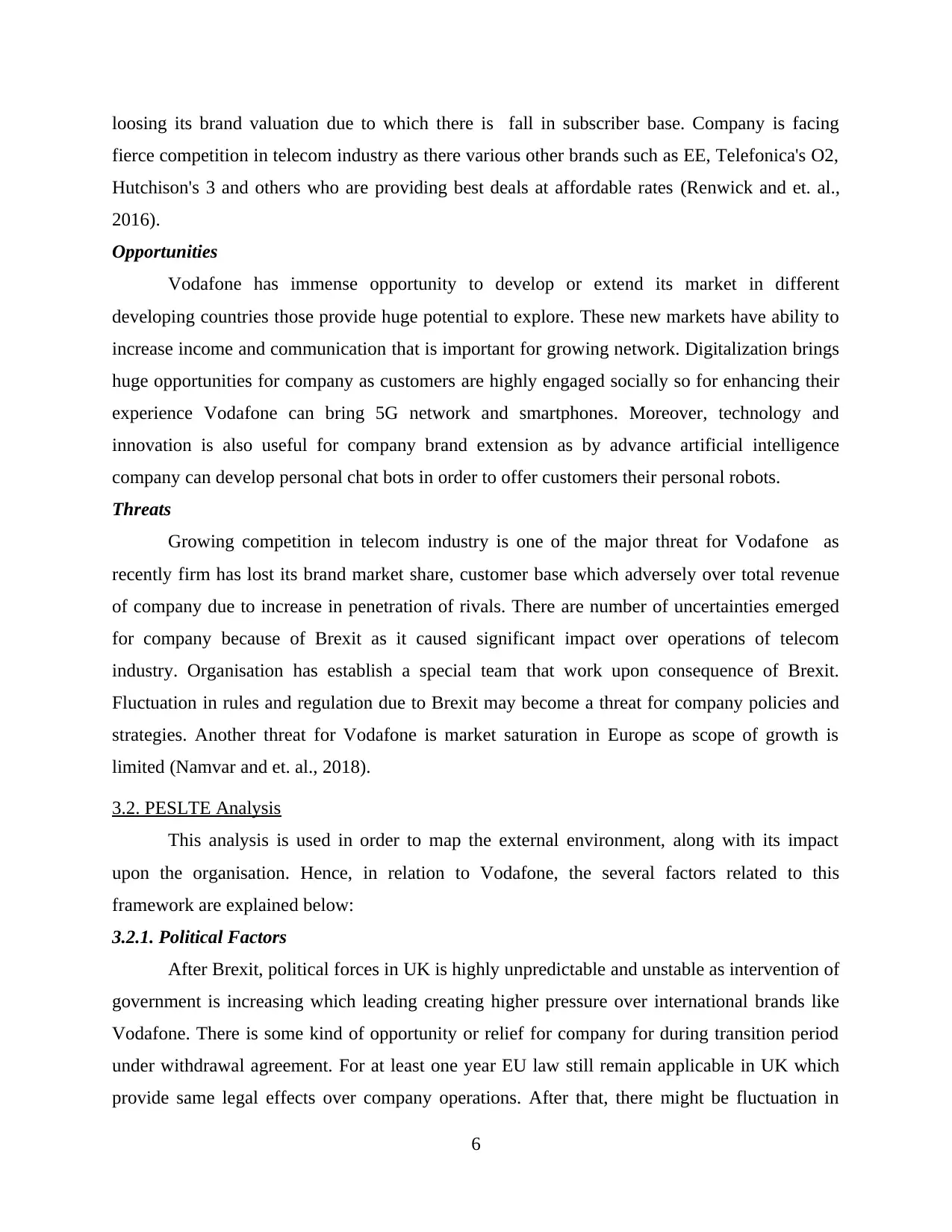
loosing its brand valuation due to which there is fall in subscriber base. Company is facing
fierce competition in telecom industry as there various other brands such as EE, Telefonica's O2,
Hutchison's 3 and others who are providing best deals at affordable rates (Renwick and et. al.,
2016).
Opportunities
Vodafone has immense opportunity to develop or extend its market in different
developing countries those provide huge potential to explore. These new markets have ability to
increase income and communication that is important for growing network. Digitalization brings
huge opportunities for company as customers are highly engaged socially so for enhancing their
experience Vodafone can bring 5G network and smartphones. Moreover, technology and
innovation is also useful for company brand extension as by advance artificial intelligence
company can develop personal chat bots in order to offer customers their personal robots.
Threats
Growing competition in telecom industry is one of the major threat for Vodafone as
recently firm has lost its brand market share, customer base which adversely over total revenue
of company due to increase in penetration of rivals. There are number of uncertainties emerged
for company because of Brexit as it caused significant impact over operations of telecom
industry. Organisation has establish a special team that work upon consequence of Brexit.
Fluctuation in rules and regulation due to Brexit may become a threat for company policies and
strategies. Another threat for Vodafone is market saturation in Europe as scope of growth is
limited (Namvar and et. al., 2018).
3.2. PESLTE Analysis
This analysis is used in order to map the external environment, along with its impact
upon the organisation. Hence, in relation to Vodafone, the several factors related to this
framework are explained below:
3.2.1. Political Factors
After Brexit, political forces in UK is highly unpredictable and unstable as intervention of
government is increasing which leading creating higher pressure over international brands like
Vodafone. There is some kind of opportunity or relief for company for during transition period
under withdrawal agreement. For at least one year EU law still remain applicable in UK which
provide same legal effects over company operations. After that, there might be fluctuation in
6
fierce competition in telecom industry as there various other brands such as EE, Telefonica's O2,
Hutchison's 3 and others who are providing best deals at affordable rates (Renwick and et. al.,
2016).
Opportunities
Vodafone has immense opportunity to develop or extend its market in different
developing countries those provide huge potential to explore. These new markets have ability to
increase income and communication that is important for growing network. Digitalization brings
huge opportunities for company as customers are highly engaged socially so for enhancing their
experience Vodafone can bring 5G network and smartphones. Moreover, technology and
innovation is also useful for company brand extension as by advance artificial intelligence
company can develop personal chat bots in order to offer customers their personal robots.
Threats
Growing competition in telecom industry is one of the major threat for Vodafone as
recently firm has lost its brand market share, customer base which adversely over total revenue
of company due to increase in penetration of rivals. There are number of uncertainties emerged
for company because of Brexit as it caused significant impact over operations of telecom
industry. Organisation has establish a special team that work upon consequence of Brexit.
Fluctuation in rules and regulation due to Brexit may become a threat for company policies and
strategies. Another threat for Vodafone is market saturation in Europe as scope of growth is
limited (Namvar and et. al., 2018).
3.2. PESLTE Analysis
This analysis is used in order to map the external environment, along with its impact
upon the organisation. Hence, in relation to Vodafone, the several factors related to this
framework are explained below:
3.2.1. Political Factors
After Brexit, political forces in UK is highly unpredictable and unstable as intervention of
government is increasing which leading creating higher pressure over international brands like
Vodafone. There is some kind of opportunity or relief for company for during transition period
under withdrawal agreement. For at least one year EU law still remain applicable in UK which
provide same legal effects over company operations. After that, there might be fluctuation in
6
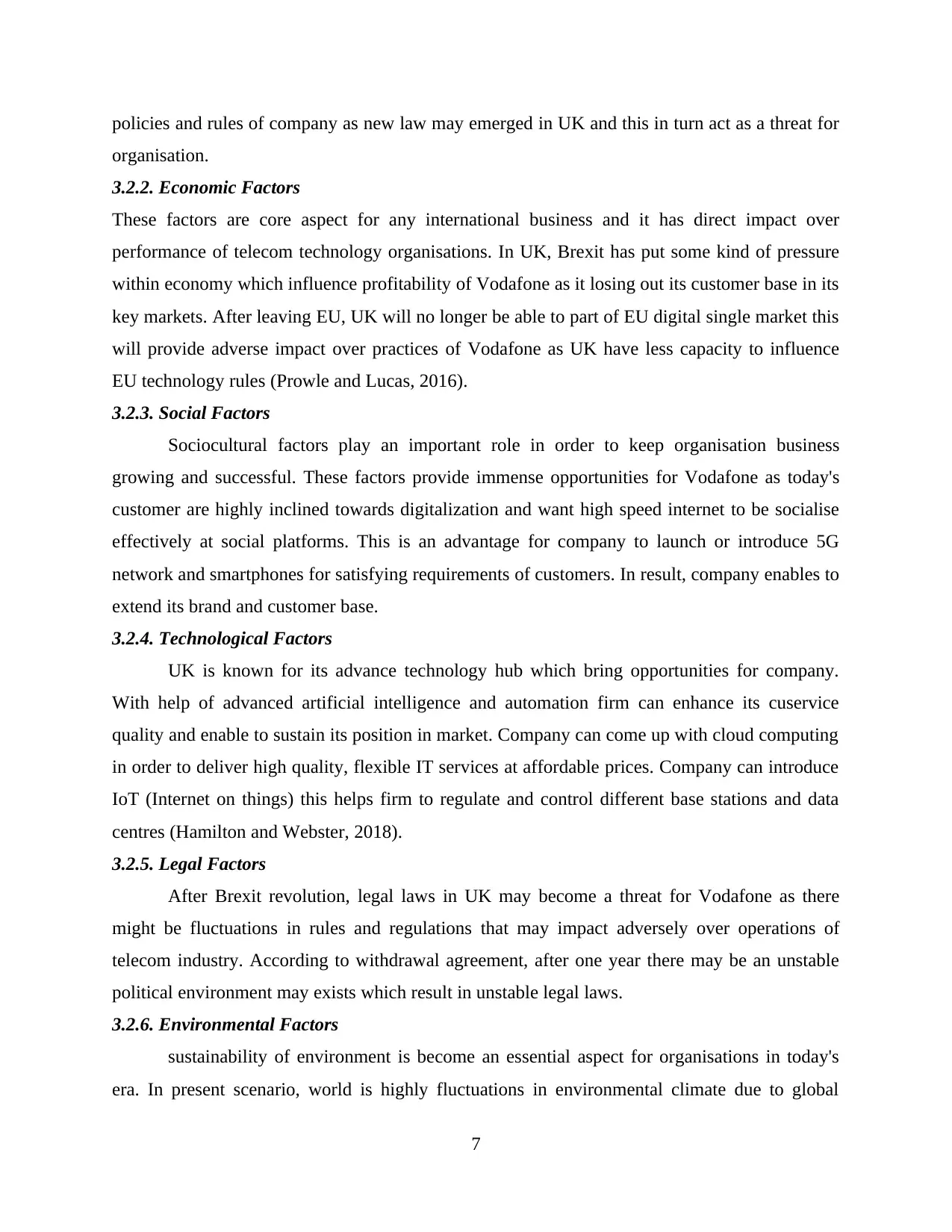
policies and rules of company as new law may emerged in UK and this in turn act as a threat for
organisation.
3.2.2. Economic Factors
These factors are core aspect for any international business and it has direct impact over
performance of telecom technology organisations. In UK, Brexit has put some kind of pressure
within economy which influence profitability of Vodafone as it losing out its customer base in its
key markets. After leaving EU, UK will no longer be able to part of EU digital single market this
will provide adverse impact over practices of Vodafone as UK have less capacity to influence
EU technology rules (Prowle and Lucas, 2016).
3.2.3. Social Factors
Sociocultural factors play an important role in order to keep organisation business
growing and successful. These factors provide immense opportunities for Vodafone as today's
customer are highly inclined towards digitalization and want high speed internet to be socialise
effectively at social platforms. This is an advantage for company to launch or introduce 5G
network and smartphones for satisfying requirements of customers. In result, company enables to
extend its brand and customer base.
3.2.4. Technological Factors
UK is known for its advance technology hub which bring opportunities for company.
With help of advanced artificial intelligence and automation firm can enhance its cuservice
quality and enable to sustain its position in market. Company can come up with cloud computing
in order to deliver high quality, flexible IT services at affordable prices. Company can introduce
IoT (Internet on things) this helps firm to regulate and control different base stations and data
centres (Hamilton and Webster, 2018).
3.2.5. Legal Factors
After Brexit revolution, legal laws in UK may become a threat for Vodafone as there
might be fluctuations in rules and regulations that may impact adversely over operations of
telecom industry. According to withdrawal agreement, after one year there may be an unstable
political environment may exists which result in unstable legal laws.
3.2.6. Environmental Factors
sustainability of environment is become an essential aspect for organisations in today's
era. In present scenario, world is highly fluctuations in environmental climate due to global
7
organisation.
3.2.2. Economic Factors
These factors are core aspect for any international business and it has direct impact over
performance of telecom technology organisations. In UK, Brexit has put some kind of pressure
within economy which influence profitability of Vodafone as it losing out its customer base in its
key markets. After leaving EU, UK will no longer be able to part of EU digital single market this
will provide adverse impact over practices of Vodafone as UK have less capacity to influence
EU technology rules (Prowle and Lucas, 2016).
3.2.3. Social Factors
Sociocultural factors play an important role in order to keep organisation business
growing and successful. These factors provide immense opportunities for Vodafone as today's
customer are highly inclined towards digitalization and want high speed internet to be socialise
effectively at social platforms. This is an advantage for company to launch or introduce 5G
network and smartphones for satisfying requirements of customers. In result, company enables to
extend its brand and customer base.
3.2.4. Technological Factors
UK is known for its advance technology hub which bring opportunities for company.
With help of advanced artificial intelligence and automation firm can enhance its cuservice
quality and enable to sustain its position in market. Company can come up with cloud computing
in order to deliver high quality, flexible IT services at affordable prices. Company can introduce
IoT (Internet on things) this helps firm to regulate and control different base stations and data
centres (Hamilton and Webster, 2018).
3.2.5. Legal Factors
After Brexit revolution, legal laws in UK may become a threat for Vodafone as there
might be fluctuations in rules and regulations that may impact adversely over operations of
telecom industry. According to withdrawal agreement, after one year there may be an unstable
political environment may exists which result in unstable legal laws.
3.2.6. Environmental Factors
sustainability of environment is become an essential aspect for organisations in today's
era. In present scenario, world is highly fluctuations in environmental climate due to global
7
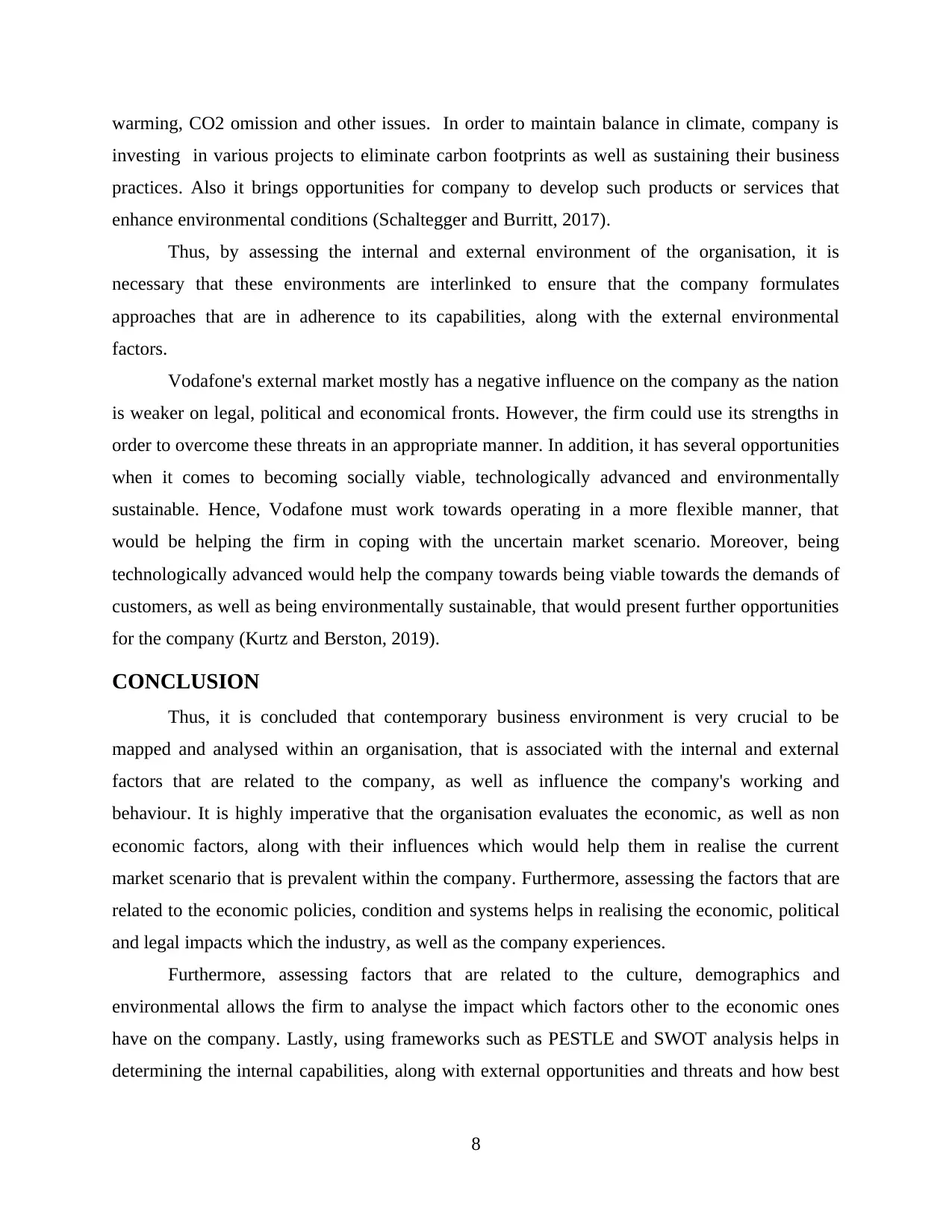
warming, CO2 omission and other issues. In order to maintain balance in climate, company is
investing in various projects to eliminate carbon footprints as well as sustaining their business
practices. Also it brings opportunities for company to develop such products or services that
enhance environmental conditions (Schaltegger and Burritt, 2017).
Thus, by assessing the internal and external environment of the organisation, it is
necessary that these environments are interlinked to ensure that the company formulates
approaches that are in adherence to its capabilities, along with the external environmental
factors.
Vodafone's external market mostly has a negative influence on the company as the nation
is weaker on legal, political and economical fronts. However, the firm could use its strengths in
order to overcome these threats in an appropriate manner. In addition, it has several opportunities
when it comes to becoming socially viable, technologically advanced and environmentally
sustainable. Hence, Vodafone must work towards operating in a more flexible manner, that
would be helping the firm in coping with the uncertain market scenario. Moreover, being
technologically advanced would help the company towards being viable towards the demands of
customers, as well as being environmentally sustainable, that would present further opportunities
for the company (Kurtz and Berston, 2019).
CONCLUSION
Thus, it is concluded that contemporary business environment is very crucial to be
mapped and analysed within an organisation, that is associated with the internal and external
factors that are related to the company, as well as influence the company's working and
behaviour. It is highly imperative that the organisation evaluates the economic, as well as non
economic factors, along with their influences which would help them in realise the current
market scenario that is prevalent within the company. Furthermore, assessing the factors that are
related to the economic policies, condition and systems helps in realising the economic, political
and legal impacts which the industry, as well as the company experiences.
Furthermore, assessing factors that are related to the culture, demographics and
environmental allows the firm to analyse the impact which factors other to the economic ones
have on the company. Lastly, using frameworks such as PESTLE and SWOT analysis helps in
determining the internal capabilities, along with external opportunities and threats and how best
8
investing in various projects to eliminate carbon footprints as well as sustaining their business
practices. Also it brings opportunities for company to develop such products or services that
enhance environmental conditions (Schaltegger and Burritt, 2017).
Thus, by assessing the internal and external environment of the organisation, it is
necessary that these environments are interlinked to ensure that the company formulates
approaches that are in adherence to its capabilities, along with the external environmental
factors.
Vodafone's external market mostly has a negative influence on the company as the nation
is weaker on legal, political and economical fronts. However, the firm could use its strengths in
order to overcome these threats in an appropriate manner. In addition, it has several opportunities
when it comes to becoming socially viable, technologically advanced and environmentally
sustainable. Hence, Vodafone must work towards operating in a more flexible manner, that
would be helping the firm in coping with the uncertain market scenario. Moreover, being
technologically advanced would help the company towards being viable towards the demands of
customers, as well as being environmentally sustainable, that would present further opportunities
for the company (Kurtz and Berston, 2019).
CONCLUSION
Thus, it is concluded that contemporary business environment is very crucial to be
mapped and analysed within an organisation, that is associated with the internal and external
factors that are related to the company, as well as influence the company's working and
behaviour. It is highly imperative that the organisation evaluates the economic, as well as non
economic factors, along with their influences which would help them in realise the current
market scenario that is prevalent within the company. Furthermore, assessing the factors that are
related to the economic policies, condition and systems helps in realising the economic, political
and legal impacts which the industry, as well as the company experiences.
Furthermore, assessing factors that are related to the culture, demographics and
environmental allows the firm to analyse the impact which factors other to the economic ones
have on the company. Lastly, using frameworks such as PESTLE and SWOT analysis helps in
determining the internal capabilities, along with external opportunities and threats and how best
8
Secure Best Marks with AI Grader
Need help grading? Try our AI Grader for instant feedback on your assignments.
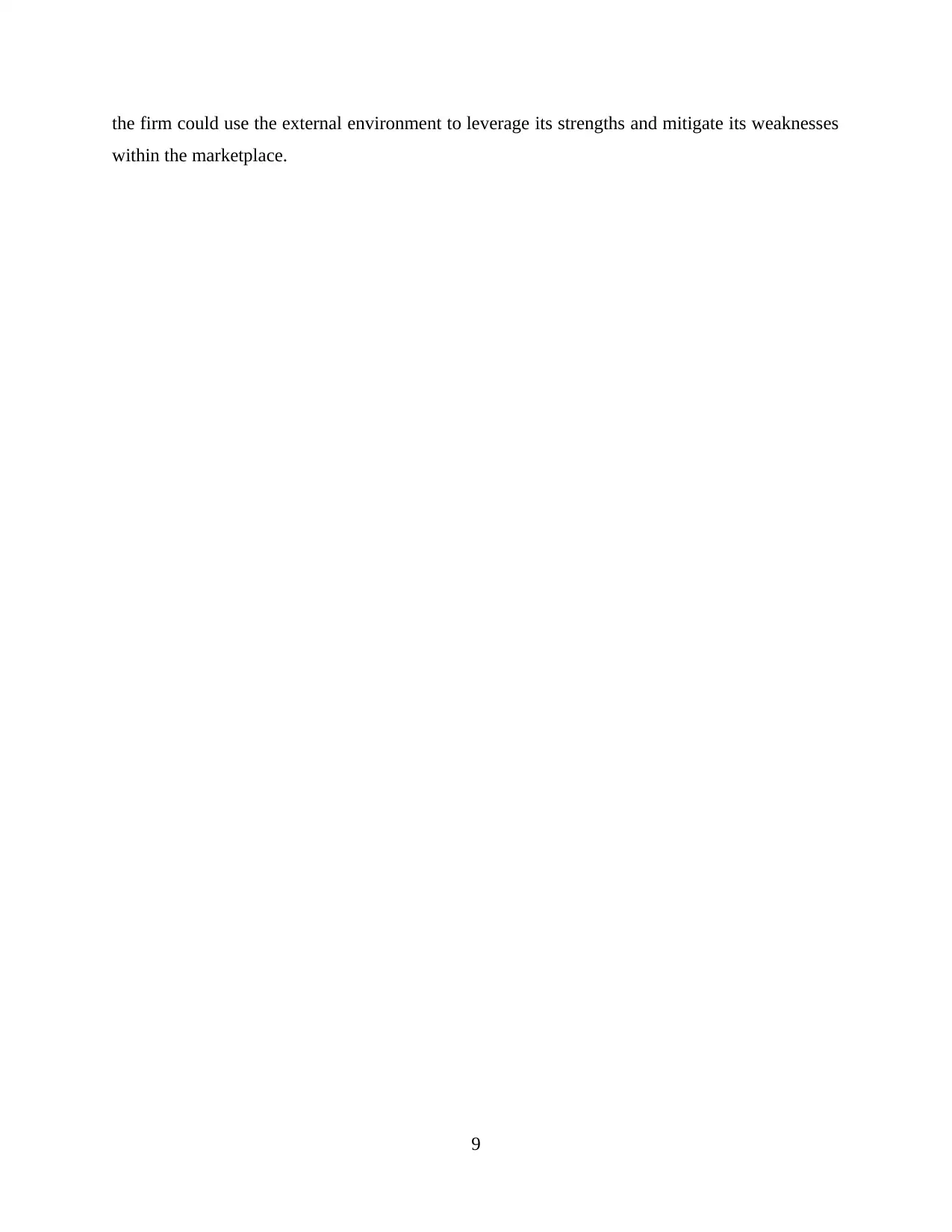
the firm could use the external environment to leverage its strengths and mitigate its weaknesses
within the marketplace.
9
within the marketplace.
9
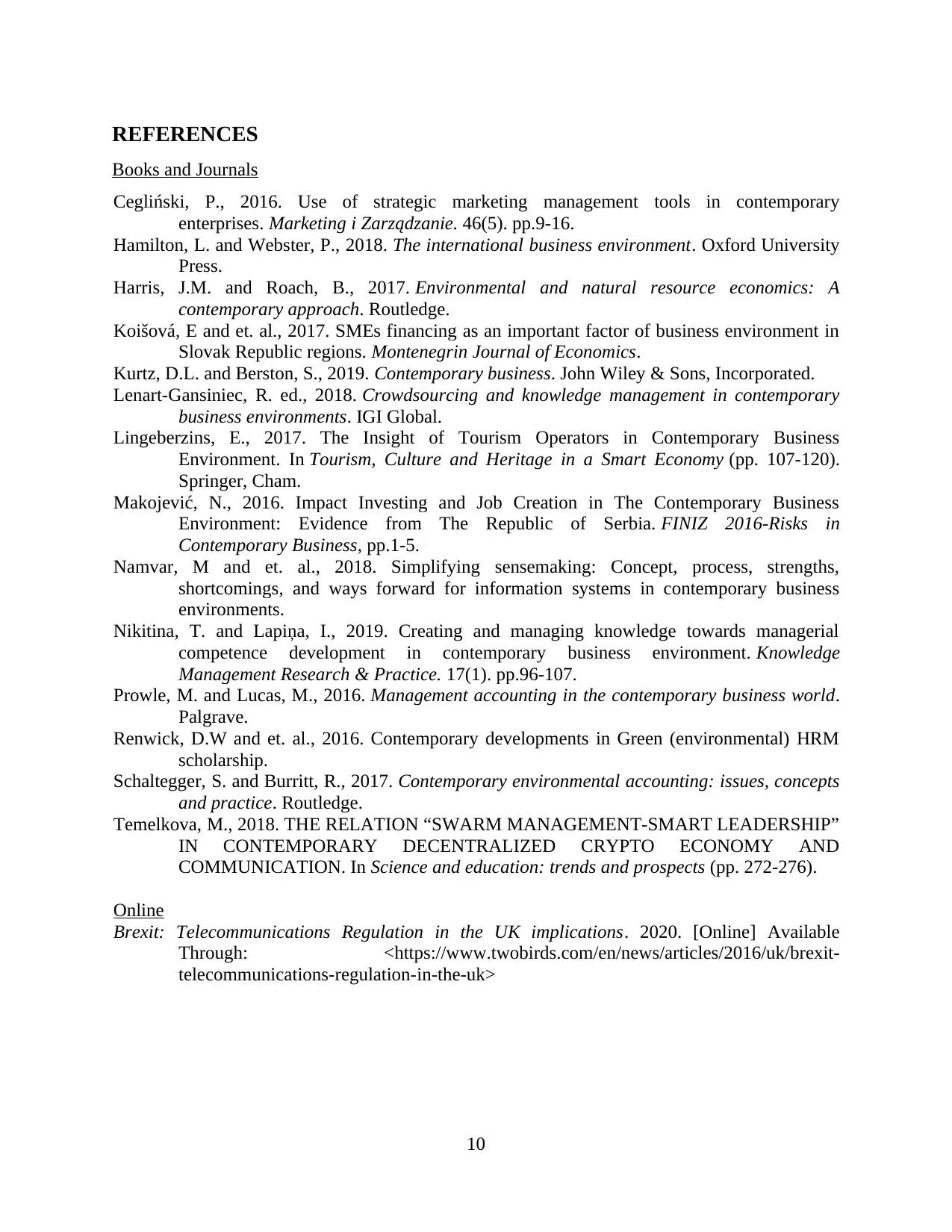
REFERENCES
Books and Journals
Cegliński, P., 2016. Use of strategic marketing management tools in contemporary
enterprises. Marketing i Zarządzanie. 46(5). pp.9-16.
Hamilton, L. and Webster, P., 2018. The international business environment. Oxford University
Press.
Harris, J.M. and Roach, B., 2017. Environmental and natural resource economics: A
contemporary approach. Routledge.
Koišová, E and et. al., 2017. SMEs financing as an important factor of business environment in
Slovak Republic regions. Montenegrin Journal of Economics.
Kurtz, D.L. and Berston, S., 2019. Contemporary business. John Wiley & Sons, Incorporated.
Lenart-Gansiniec, R. ed., 2018. Crowdsourcing and knowledge management in contemporary
business environments. IGI Global.
Lingeberzins, E., 2017. The Insight of Tourism Operators in Contemporary Business
Environment. In Tourism, Culture and Heritage in a Smart Economy (pp. 107-120).
Springer, Cham.
Makojević, N., 2016. Impact Investing and Job Creation in The Contemporary Business
Environment: Evidence from The Republic of Serbia. FINIZ 2016-Risks in
Contemporary Business, pp.1-5.
Namvar, M and et. al., 2018. Simplifying sensemaking: Concept, process, strengths,
shortcomings, and ways forward for information systems in contemporary business
environments.
Nikitina, T. and Lapiņa, I., 2019. Creating and managing knowledge towards managerial
competence development in contemporary business environment. Knowledge
Management Research & Practice. 17(1). pp.96-107.
Prowle, M. and Lucas, M., 2016. Management accounting in the contemporary business world.
Palgrave.
Renwick, D.W and et. al., 2016. Contemporary developments in Green (environmental) HRM
scholarship.
Schaltegger, S. and Burritt, R., 2017. Contemporary environmental accounting: issues, concepts
and practice. Routledge.
Temelkova, M., 2018. THE RELATION “SWARM MANAGEMENT-SMART LEADERSHIP”
IN CONTEMPORARY DECENTRALIZED CRYPTO ECONOMY AND
COMMUNICATION. In Science and education: trends and prospects (pp. 272-276).
Online
Brexit: Telecommunications Regulation in the UK implications. 2020. [Online] Available
Through: <https://www.twobirds.com/en/news/articles/2016/uk/brexit-
telecommunications-regulation-in-the-uk>
10
Books and Journals
Cegliński, P., 2016. Use of strategic marketing management tools in contemporary
enterprises. Marketing i Zarządzanie. 46(5). pp.9-16.
Hamilton, L. and Webster, P., 2018. The international business environment. Oxford University
Press.
Harris, J.M. and Roach, B., 2017. Environmental and natural resource economics: A
contemporary approach. Routledge.
Koišová, E and et. al., 2017. SMEs financing as an important factor of business environment in
Slovak Republic regions. Montenegrin Journal of Economics.
Kurtz, D.L. and Berston, S., 2019. Contemporary business. John Wiley & Sons, Incorporated.
Lenart-Gansiniec, R. ed., 2018. Crowdsourcing and knowledge management in contemporary
business environments. IGI Global.
Lingeberzins, E., 2017. The Insight of Tourism Operators in Contemporary Business
Environment. In Tourism, Culture and Heritage in a Smart Economy (pp. 107-120).
Springer, Cham.
Makojević, N., 2016. Impact Investing and Job Creation in The Contemporary Business
Environment: Evidence from The Republic of Serbia. FINIZ 2016-Risks in
Contemporary Business, pp.1-5.
Namvar, M and et. al., 2018. Simplifying sensemaking: Concept, process, strengths,
shortcomings, and ways forward for information systems in contemporary business
environments.
Nikitina, T. and Lapiņa, I., 2019. Creating and managing knowledge towards managerial
competence development in contemporary business environment. Knowledge
Management Research & Practice. 17(1). pp.96-107.
Prowle, M. and Lucas, M., 2016. Management accounting in the contemporary business world.
Palgrave.
Renwick, D.W and et. al., 2016. Contemporary developments in Green (environmental) HRM
scholarship.
Schaltegger, S. and Burritt, R., 2017. Contemporary environmental accounting: issues, concepts
and practice. Routledge.
Temelkova, M., 2018. THE RELATION “SWARM MANAGEMENT-SMART LEADERSHIP”
IN CONTEMPORARY DECENTRALIZED CRYPTO ECONOMY AND
COMMUNICATION. In Science and education: trends and prospects (pp. 272-276).
Online
Brexit: Telecommunications Regulation in the UK implications. 2020. [Online] Available
Through: <https://www.twobirds.com/en/news/articles/2016/uk/brexit-
telecommunications-regulation-in-the-uk>
10
1 out of 12
Related Documents
Your All-in-One AI-Powered Toolkit for Academic Success.
+13062052269
info@desklib.com
Available 24*7 on WhatsApp / Email
![[object Object]](/_next/static/media/star-bottom.7253800d.svg)
Unlock your academic potential
© 2024 | Zucol Services PVT LTD | All rights reserved.





